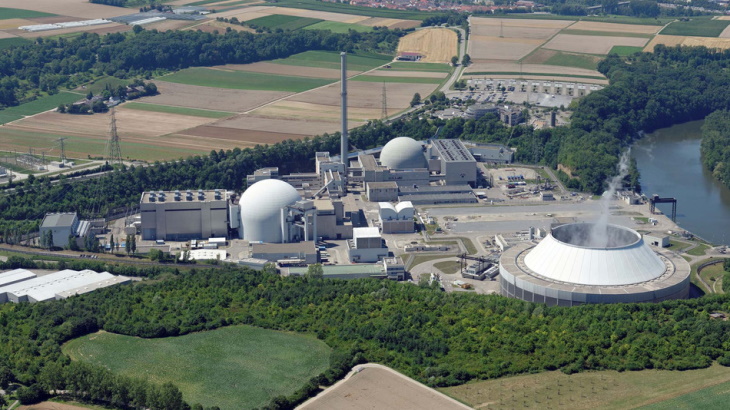This past week saw the unimaginable: a leading modern industrialised economy has shutdown its entrire nuclear power generation grid. Why has Germany pulled the plug on its own energy independence? Who is driving this agenda, and what does it mean for Germany’s national energy security and sovereignty?
The closure of the facility at Emsland, and the Neckarwestheim II and Isar II facilities last week was celebrated by the Greens, and heralded as a victory for anti-nuclear campaigners at rallies hosted in Berlin and Munich.
On the surface, this may seem like it was spurred on by the 2011 meltdown at Fukushima in Japan, with pressure placed on successive governments to end the use of nuclear power which Green campaigners and politicians argue is ‘unsafe and unsustainable.’ However, this seems more likely to be part of the wider geostrategic energy realignment.
“Today’s receipt of the dismantling permit for Neckarwestheim 2 is not only an important step for the Neckarwestheim site, but also a strong signal that EnBW is serious about implementing the energy transition,” said Jörg Michels, Managing Director of the EnBW nuclear power division. “Our master plan for decommissioning, which we defined more than ten years ago, aims, among other things, to ensure the safe and speedy decommissioning of our nuclear power plants. (Source: World Nuclear News)
It’s important to note that Germany is now almost completely dependent on western energy vendors, namely the USA and its resurgent trans Atlantic LNG trade to Europe.
Hence, this latest nuclear closure event should be viewed properly in the context the Ukraine war, anti-Russian sanctions, and the subsequent attack on the German-Russian joint Nordstream pipelines infrastructure.
Zero Hedge reports…
One might say that the timing could not be worse for the implementation of “net zero” climate goals given the already boiling economic instability across the western world. Then again, maybe the timing is perfect for the people in power?
With stagflation still running rampant in the US and Europe the last thing anyone should be worried about is a less than 1°C rise in global temperatures in the past 100 years. There is no concrete evidence of any significant climate crisis, and all the people who tell us a crisis is right around the corner do so while raking in billions in funding dollars from governments and think-tank institutions with a vested interest in reinforcing the hysteria. In other words, there is no basis for exponential restrictions on “greenhouse gas” emissions. The climate crisis claim is a sham.
When the policies of the climate cult are examined with a clear head, it becomes obvious that saving the planet is not a primary concern. Rather, the purpose of the agenda is to increase power to government bureaucracies on a level not seen since the feudal empires of centuries past. Get ready for the return of the peasant lifestyle…
One factor that consistently arises in the fight over climate change mandates is the increasing need for energy clashing with deliberate cuts to the means of production. Establishment elites want restricted energy access for the public, and they want people to pay more for each slice of the ever shrinking pie. A perfect example of this dynamic is the widespread effort by such governments to shut down nuclear power plants, one of the cleanest forms of energy we have from the standpoint of carbon emissions.
Germany, already in the midst of an energy shortfall due to the loss of natural gas supplies from Russia, has also just closed its last three operational nuclear power plants this past week, leaving the nation high and dry when it comes to easy accessible electricity. Germany has some of the highest residential electricity prices in all of Europe and they are about to explode even more in the near term.

IMAGE: Neckarwestheim II nuclear plant in Germany.
As energy prices rose last year as a result of the Ukraine conflict, certain members of German Chancellor Olaf Scholz’s government became hesitant to close the nuclear plants as planned on December 31, 2022. Scholz agreed to a one-time extension of the deadline but insisted on the final countdown taking place on April 15.
Alongside the closure of the nuclear plants, German multinational electric utility E.ON increased its prices by as much as 45% starting June 1.
“In parts of NRW (North Rhine-Westphalia), the new price is 49.44 cents gross per kilowatt hour, which means an adjustment of around 45 percent for an average consumption,” said a spokesman for Eon Energie in Germany.
Ironically, shortages last winter compelled the German government to increase coal fired power plant operations, yet they are still shutting down clean energy nuclear plants to make way for so-called renewables. If climate change initiatives don’t seem to be making much sense these days, its because there is no logic behind them other than to create incremental chaos. The confusion over conflicting green policies makes way for notoriously inefficient wind and solar power farms that cannot sustain the existing population, but it also allows for a global political power grab on an unprecedented scale.
READ MORE GERMANY NEWS AT: 21st Century Wire Germany Files
PLEASE HELP SUPPORT OUR INDEPENDENT MEDIA PLATFORM HERE
















